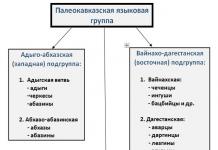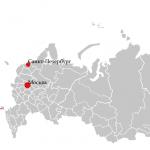ANDmagazine “Science and Life” (No. 3, 2006)
How many languages can a person learn?
Cardinal Giuseppe Caspar Mezzofanti spoke 39 languages and 50 dialects fluently, although he never traveled outside of Italy. Born into the family of a poor carpenter in Bologna. While still at the church school, he learned Latin, ancient Greek, Spanish and German, and from the school teachers - former missionaries in Central and South America - he learned several Indian languages. Mezzofanti shone in other subjects and graduated from school ahead of schedule, so that due to his youth he could not be ordained a priest. While waiting for this sacrament for several years, he learned a number of Oriental and Middle Eastern languages. During the Napoleonic Wars, he served as a chaplain in a hospital, where he “picked up” several more European languages from the wounded and sick. For many years he was the chief curator of the Vatican Library, where he also expanded his linguistic knowledge.
In October 2003, Dick Hudson, a professor of linguistics at University College London, received an interesting email. The author of the letter belatedly stumbled upon a question asked by Hudson several years earlier on a linguistic forum on the Internet: which polyglot holds the world record for the number of languages? And he answered: perhaps it was my grandfather.
The author of the letter, who lives in the United States and asked not to use his last name in print or on the Internet, reported that his grandfather, an Italian who emigrated from Sicily to America in the tenth years of the last century, never attended school, but learned foreign languages with extraordinary ease. By the end of his life, the previously illiterate Sicilian spoke 70 world languages and could read and write 56 of them.
When this phenomenon arrived in New York, he was 20 years old; he got a job as a porter at a railway station, and his work constantly brought him into contact with people of different nationalities. This is how his interest in languages began.
Apparently, things went well for the young porter with unusual linguistic abilities, so that, as his grandson reports, in the 50s of the last century, he and his grandfather made a six-month trip around the world. And in every country - and they visited Venezuela, Argentina, Norway, England, Portugal, Italy, Greece, Turkey, Syria, Egypt, Libya, Morocco, South Africa, Pakistan, India, Thailand, Malaysia, Indonesia, Australia, the Philippines, Hong Kong and Japan - grandfather spoke to the locals in their language.
It is curious that the travelers spent two weeks in Thailand. The polyglot grandfather did not know Thai, but by the end of his stay he was already bargaining in Thai at the bazaar. His grandson, later serving in the American army, spent a year and a half in Thailand and mastered some of the local language. When he returned to the United States, he discovered that his grandfather knew Thai better than him.
The grandson of the polyglot told the professor that this was not the first time in their family that they knew multiple languages. Great-grandfather and his brother spoke more than a hundred languages.
Other correspondents of Professor Hudson reminded him of such outstanding personalities as the Italian Cardinal Giuseppe Mezzofanti (1774-1849), who knew 72 languages and spoke 39 of them fluently. Or the Hungarian translator Kato Lomb (1909-2003), who spoke 17 languages and could read another 11 (see Science and Life No. 8, 1978). Or the German Emil Krebs (1867-1930), who spoke 60 languages fluently (for example, he learned Armenian in nine weeks).
According to some reports, the 19th century German scientist Friedrich Engels knew 24 languages.
For such phenomena, Professor Hudson coined the term “hyperpolyglots.” This includes everyone who speaks six or more languages. Why exactly six? Because in some areas of the Earth, almost one hundred percent of the population speaks up to five languages fluently. So, in Switzerland there are four official languages, and many Swiss know all four, plus English.
Linguists, psychologists and neuroscientists are interested in such people. Do hyperpolyglots have any special brains, and if so, what is this feature? Or are they ordinary people with average brains who have achieved extraordinary results through luck, personal motivation and hard work? For example, Heinrich Schliemann learned 15 languages, since he needed languages both as an international businessman and as an amateur archaeologist. It is believed that Cardinal Mezzofanti once learned a rare language for Italy in one night, since in the morning he had to accept confession from a foreign criminal sentenced to death.
The existence of people who know several dozen languages is often disputed by skeptics. So, on the same forum on the Internet, one of the participants writes: “Could Mezzofanti know 72 languages? How long would it take to study them? If we assume that each language has 20 thousand words (an underestimate) and that a capable person remembers one word in a minute after hearing or seeing it for the first time, then 72 languages would take five and a half years of continuous study for 12 hours a day. Is this possible? And, let’s add, even having learned 72 languages, how much time a day should you spend on maintaining them in working tone?
But some linguists believe that there is nothing impossible about this. Thus, Suzanne Flynn from the Massachusetts Institute of Technology (USA) believes that there are no limits to the human brain’s ability to learn new languages; only a lack of time can interfere. Steven Pinker from Harvard University (USA) also believes that there is no theoretical limit, unless similar languages in one head begin to interfere with each other. It's just a matter of a person's desire.
Other researchers, however, believe that the brain of a hyperpolyglot has some special features. This assumption is supported by the fact that extraordinary abilities for languages are often associated with left-handedness, difficulties with spatial orientation and some other mental characteristics.
The brain of the German hyperpolyglot Krebs, who served as a translator at the German Embassy in China, is preserved in a collection of brains of outstanding people. It shows slight differences from the normal brain in the area that controls speech. But whether these differences were innate or appeared after the owner of this brain learned 60 languages is unknown.
In the section on the question, what is the name of a person who knows many languages (or is simply very smart)? given by the author Bloodsucking the best answer is many languages - polyglot!
Reply from Seestern[guru]
quick wit
ingenuity
resourcefulness
Reply from Andrey Azarov[guru]
actually there are a lot of synonymous words in this context...
polyglot
connoisseur
intellectual
smart guy
etc.
he, showing miracles of intellect
knowledge
- you can write
the rest has already been written above
Reply from I-beam[guru]
If I'm not mistaken, then a person who knows many languages is called a polyglot, or maybe it's not from that opera anyway, but just very smart - a child prodigy, a genius, etc., etc.
Reply from Suck through[guru]
A polyglot (from the Greek poly “many” and glotta “language”) is a person who speaks many languages.
The most outstanding polyglot is considered to be the Italian Cardinal Giuseppe Mezzofanti (1774-1849), who never left Italy, but was fluent in 38 languages and fluent in another 30 languages; in addition, he knew 50 dialects of various languages.
Polyglots also include Antony Grabovsky, the orientalist Arminius Vamberi, the writer, poet and revolutionary Jose Rizal, the creator of Esperanto Ludwik Zamenhof, the archaeologist Heinrich Schliemann, and Pope John Paul II.
Reply from Xenia[guru]
polyglot - a person who owns several languages. languages.
An intelligent person is called an erudite.
You can say this: “Showing miracles of erudition...”
If you are learning English, then, of course, you have heard about polyglots who managed to learn 5/10/30/50 languages. Which of us doesn’t have the thought: “Surely they have some secrets, because I’ve been learning one and only English for years!” In this article we will present the most common myths about those who successfully learn foreign languages, and also tell you how polyglots learn languages.
A polyglot is a person who can communicate in several languages. Some of the most famous polyglots in the world are:
- Cardinal Giuseppe Mezzofanti, according to various sources, spoke 80-90 languages.
- Translator Kato Lomb spoke 16 languages.
- Archaeologist Heinrich Schliemann spoke 15 languages.
- Writer Leo Tolstoy spoke 15 languages.
- Writer Alexander Griboyedov spoke 9 languages.
- Inventor Nikola Tesla spoke 8 languages.
- Writer Anthony Burgess spoke 12 languages.
- Luca Lampariello
- Sam Jandreau
- Ollie Richards is a contemporary and speaks 8 languages.
- Randy Hunt is a contemporary and speaks 6 languages.
- Donovan Nagel is a contemporary and speaks 10 languages.
- Benny Lewis is a contemporary and speaks 11 languages.
It should be said that basically all polyglots know 2-3 languages at a high level, and speak the rest at the “survival” level, that is, they can communicate on simple topics.
Another interesting feature is that the first foreign language is always the hardest and takes the longest to learn, while subsequent ones are learned much faster and are easier. It is especially easy to learn languages of one group, for example: Italian, French and Spanish.
7 common myths about polyglots
Myth #1: Polyglots are people with special abilities for languages.
Some people believe that polyglots do not need to strain at all: the languages themselves are absorbed in their heads without effort or practice. There is an opinion that those who know many languages have a different brain structure, they easily perceive and reproduce information, grammar is given to them without studying, on its own, etc.
Is it true:
A polyglot is an ordinary person who likes to learn several languages and who makes every effort to do so. There is no such person who could not become a polyglot, because this does not require any special knowledge or mindset. All you need is work and passion.
Don’t be in a hurry to be fluent (you’ll frustrate yourself). Just enjoy the process. It’s slow and not always easy, but it can be enjoyable if you take the pressure off yourself.
Don't rush to fluency straight away (you'll only end up frustrated). Just enjoy the process. It will be slow and not always easy, but it can be fun if you don't push yourself.
Myth #2: Polyglots have unique memories
There is an opinion that all polyglots have a phenomenal memory, so any languages are easy for them. People believe that polyglots remember the meanings of absolutely all unfamiliar words and grammatical structures from the very first time, so subsequently they can easily speak the language they are learning.
Is it true:
Polyglots do have a good memory, but many people confuse cause and effect: it is the study of languages that develops memory, and not unique innate abilities that make it possible to learn a language. Indeed, there are people who can boast of a unique memory, but this does not make them polyglots. The fact is that simply memorizing words or phrases is not enough to fully learn a language.
Myth #3: Polyglots started learning languages at a young age
Another popular myth goes something like this: “Polyglots are people whose parents took them to language courses since childhood. Children find it easier to study, so today these people easily speak several foreign languages.”
Is it true:
For the most part, polyglots are people who are in love with foreign languages. And this love came already at a conscious age. Those who learned foreign languages as children do not have any advantages over adult learners. Most linguists and psychologists are convinced that languages are even easier for adults, because an adult, unlike a child, consciously takes this step and understands why he needs to read texts or translate sentences. Read the article “”, you will see that adults have their own advantages over children in learning foreign languages.
Myth #4: Polyglots can learn any language in 3-5 months
The issue of the need to study English and other languages is especially relevant today, so almost every day we read another article or watch an interview with a polyglot. These people sometimes claim that they learned a foreign language in 3-5 months. At the same time, many polyglots, in their interviews or articles, immediately offer you to purchase for money a language learning course that they themselves invented. Is it worth spending money on this?
Is it true:
In fact, polyglots rarely clarify what they mean by the phrase “I learned a language in 5 months.” As a rule, during this time a person has time to learn the basics of grammar and basic vocabulary in order to explain himself in everyday communication. But to talk about more complex topics, for example about life and the structure of the Universe, any person needs more than 5 months. Those who speak several languages really well will tell you that they have been studying them for years and are constantly improving their knowledge. Therefore, if you plan to advance beyond the level of “reading, translating with a dictionary,” prepare not for 3-5 months, but for at least 1-2 years of studying your first foreign language “from scratch.”
Myth #5: Polyglots have a lot of free time
When we read articles about polyglots, it seems that all they do is give interviews from morning to night and tell how they managed to achieve success in the field of learning foreign languages. This is where the myth arose that those who don’t work learn languages; they say they mastered English simply “out of nothing to do.”
Is it true:
To confirm our words, watch this video by polyglot Ollie Richards, he talks about life hacks that will help even the busiest people learn a language:
Myth #6: Polyglots travel a lot
Many people believe that you can “truly” learn a foreign language only abroad, in the country of native speakers of that language. There is an opinion that abroad you can completely “immerse” yourself in the subject you are studying, create an ideal language environment, etc. It turns out that in order to become a polyglot, you need to constantly travel around countries.
Is it true:
In fact, most polyglots say that they communicate a lot with native speakers of the language they are learning, are interested in their way of life, culture, etc. However, this does not mean that people studying foreign languages travel 365 days a year. Technologies allow every person to communicate with people from any country without leaving home. Visit the language exchange sites listed in this article. On them you can find someone to talk to from the USA, Great Britain, Australia, and any other country. Polyglots take advantage of this same opportunity and successfully learn new languages. In the article "" we gave 15 tips for creating a language environment for learning English in your native country.
You can recreate an immersion environment at home, by streaming movies, listening to podcasts, playing music, and reading in your target language... all you need is an internet connection.
You can immerse yourself in a language environment at home by watching movies, listening to podcasts and music, reading in your target language... all you need is an internet connection.
Myth #7: Polyglots have a lot of money
This myth is closely related to the previous two: people believe that polyglots do not work, but only travel. In addition, people think that polyglots constantly spend large sums on educational materials: they buy tutorials and dictionaries, take expensive lessons from native-speaking teachers, and travel abroad for language courses. People believe that polyglots have a lot of money and therefore opportunities to learn foreign languages.
Is it true:
At the time of writing this article, “millionaire” and “polyglot” are not identical concepts. As we have already found out, polyglots are not on a continuous journey and among them there are many who are just like you and me, ordinary working people. It’s just that those who want to know many languages use every opportunity to gain knowledge. It should be said that we have a lot of such opportunities: from all kinds of courses to thousands of educational Internet resources. For example, you can learn English on the Internet completely free of charge, and to make it easier for you to find the sites you need, we constantly write articles with collections of tips and useful resources for developing certain skills. Subscribe to our newsletter and you won't miss important information.
Secrets of polyglots: how to learn foreign languages
1. Set yourself a clear goal
Learning a foreign language "because everyone else is learning it" won't last long, so decide why you need to know it. The goal can be anything: from serious, for example, to get a position in a prestigious company, to entertaining, like “I want to understand what Sting sings about.” The main thing is that your goal motivates you and in every possible way strengthens your desire to learn English. To strengthen your desire to learn a language, we advise you to read our articles “” and “”.
2. At the beginning of your studies, take at least a few lessons from a teacher
We've all read about how polyglots master any language on their own. However, many polyglots write blogs and often indicate that they started learning the language with a teacher, and after learning the basics they moved on to independent learning. We recommend doing the same: the teacher will help you lay a solid foundation of knowledge, and you can build subsequent “floors” yourself if you wish. If you decide to follow this advice, we suggest you try it with one of our experienced teachers. We can help you “promote” English to any level of knowledge.
3. Speak out loud from the first day of learning a new language
Even if you are learning your first ten words, say them out loud, this way you will remember the vocabulary better. In addition, you will gradually develop correct pronunciation. From the very first day, look for interlocutors to communicate with. For beginners, the ideal “partner” for developing oral speech would be a professional teacher, and at the advanced level, you can look for an interlocutor on language exchange sites and hone your speaking skills with a native speaker. Please note: almost all polyglots claim that the most effective and interesting method of learning a new language is communicating with native speakers. At the same time, polyglots say that during communication, words and grammatical structures are easier to remember: you do not force yourself to study them, but remember them during an interesting conversation.
My absolute favorite language learning activity is talking to people! And it turns out, that’s pretty convenient, because that’s the whole reason we learn languages anyway, right? We learn the language in order to use it. And since language is a skill, the best way to learn it is by using it.
My favorite activity in language learning is communicating with people! And it turns out that this is quite convenient, because this is the reason we learn languages, right? We learn a language in order to use it. And since language is a skill, the best way to improve it is to use it.
4. Learn phrases, not individual words.
Watch this video by Luca Lampariello, he talks about how to learn new words (you can turn on Russian or English subtitles in the settings).
5. Don't get bogged down in theoretical grammar.
But this advice must be understood correctly, because lately the opinion that English grammar is unnecessary knowledge has been actively discussed on the Internet. Allegedly, for communication it is enough to know three simple tenses and a lot of words. However, in the article “” we explained why this opinion is fundamentally wrong. What do polyglots mean? They encourage us to pay less attention to theory, and more to practical exercises, the use of grammatical structures in oral and written speech. Therefore, immediately after familiarizing yourself with the theory, proceed to practice: do translation exercises, grammar tests, use the studied structures in speech.
6. Get used to the sound of new speech
I love to listen to podcasts, interviews, audiobooks or even music in my target language while walking or driving. This makes efficient use of my time and I don’t feel like I’m making any particular kind of effort.
I love listening to podcasts, interviews, audio books, or even music in the language I'm learning while I'm walking or driving. This allows me to use my time effectively without feeling like I'm making any special effort.
7. Read texts in the target language
While reading texts, you see how the grammar you are studying “works” in speech and how new words “cooperate” with each other. At the same time, you use visual memory, which allows you to remember useful phrases. On the Internet you can find texts in any language for beginners, so you need to start reading from the very first days of learning the language. Some polyglots advise practicing, for example, reading text in parallel in Russian and English. This way you can see how sentences are constructed in the language you are learning. In addition, polyglots claim that this allows them to wean themselves from the harmful habit of translating speech word for word from their native language into the target language.
8. Improve your pronunciation
9. Make mistakes
“Get out of your comfort zone!” - this is what polyglots call us to. If you are afraid to speak the language you are learning or try to express yourself in simple phrases to avoid mistakes, then you are deliberately creating an obstacle for yourself to improve your knowledge. Don’t be shy about making mistakes in the language you’re learning, and if you’re so tormented by perfectionism, take a look at RuNet. Native speakers of the Russian language, without a shadow of embarrassment, write words like “potential” (potential), adykvatny (adequate), “pain and numbness” (more or less), etc. We urge you to take an example from their courage, but at the same time try to take into account your own mistakes and eradicate them. At the same time, polyglots remind us of how children learn to speak their native language: they begin to speak with mistakes, adults correct them, and over time the child begins to speak correctly. Do the same: it's okay to learn from your mistakes!
Make at least two hundred mistakes a day. I want to actually use this language, mistakes or not.
Make at least two hundred mistakes a day. I want to use this language, with or without errors.
10. Exercise regularly
The main secret of polyglots is diligent study. There is not a single person among them who would say: “I studied English once a week and learned the language in 5 months.” On the contrary, polyglots, as a rule, are in love with learning languages, so they devoted all their free time to it. We are sure that anyone can find 3-4 hours a week to study, and if you have the opportunity to study for 1 hour a day, any language will conquer you.
11. Develop your memory
The better your memory is, the easier it will be to remember new words and phrases. Learning a foreign language in itself is an excellent memory training, and to make this training more productive, use different ways of learning the language. For example, solving is a fun and useful activity for both learning and memory. - another good idea for training: you can learn the lyrics of your favorite hit by heart, this way you will remember several useful phrases.
12. Follow the example of successful people
Polyglots are always open to new ways of learning; they do not stand still, but are interested in the experiences of other people who successfully learn foreign languages. We have devoted several articles to some of the most famous polyglots; you can read about the experience of learning languages, or study.
13. Curb your appetite
The variety of materials allows you not to get bored and enjoy learning a foreign language, but at the same time, we advise you not to “spray yourself”, but to focus on some specific methods. For example, if on Monday you took one textbook, on Tuesday you grabbed a second one, on Wednesday you studied on one site, on Thursday on another, on Friday you watched a video lesson, and on Saturday you sat down to read a book, then by Sunday you risk getting “porridge” there is an abundance of material in your head, because their authors use different principles for presenting information. Therefore, as soon as you start learning a new language, determine the optimal set of textbooks, websites and video lessons. There shouldn’t be 10-20 of them; limit your “appetite”, otherwise scattered information will be poorly absorbed. You will find ideas for choosing materials that suit you in our article “”, where you can download a free list of the “best” materials for learning a language.
14. Enjoy learning
Among the famous polyglots there is not a single person who would say: “Learning languages is boring, I don’t like to do it, but I want to know many languages, so I have to force myself.” How do polyglots learn languages? These people enjoy not just the understanding that they know a foreign language, but also the learning process itself. Do you think studying is boring? Then use interesting language learning techniques. For example, or is unlikely to seem boring to anyone.
Languages are not something one should study, but rather live, breathe and enjoy.
Languages are not something to be learned, but rather something to be lived, breathed and enjoyed.
Now you know how polyglots learn languages. As you have seen, everyone can learn foreign languages, regardless of “giftedness” and the number of banknotes. There is nothing complicated in the advice of polyglots on learning languages; all techniques are accessible to anyone and are easily applied in practice. Try to follow these guidelines and enjoy learning.
In general, he says that he knows “only” 100. But he is being modest. During the conversation, we calculated that Sergei Anatolyevich - head of the department of the Russian Humanitarian University, Doctor of Philology, corresponding member of the Russian Academy of Natural Sciences - is familiar with no less than 400 languages, taking into account the ancient and languages of small endangered peoples. It only takes him three weeks to learn a language. Among his colleagues, this 43-year-old professor has a reputation as a “walking encyclopedia.” But at the same time he is distinguished by... bad memory.
The most difficult question for me is: “How many languages do you know?” Because it is impossible to answer it accurately. Even 10 languages cannot be known to the same extent. You can know 500 - 600 words and be able to communicate perfectly well in the country. For example, I know English perfectly, because I have to travel and talk all the time. But I think that my German is better in passive. You can speak poorly, but read well. For example, I read ancient Chinese classics better than most Chinese. Or you can not read or speak, but know the structure and grammar. I cannot speak Negidal or Nanai, but I remember their vocabulary well. Many languages become passive, but then, if necessary, they return: I went to Holland and quickly restored the Dutch language. Therefore, if we count all the languages with which I am familiar at different levels of knowledge, then there will be at least 400 of them. But I actively speak only 20.

Do you feel unique?
- No, I know a lot of people who already know several dozen languages. For example, 80-year-old Australian professor Stephen Wurm knows more languages than I do. And he speaks fluently at thirty.
- Collecting languages - for sport?
- We must distinguish between linguists and polyglots. Polyglots are people who specialize in absorbing a colossal number of languages. And if you are engaged in science, then language is not an end in itself, but a working tool. My main activity is comparing language families with each other. To do this, it is not necessary to speak every language, but you need to keep in mind a colossal amount of information about the roots, grammar, and origin of words.

Is your language learning process still ongoing?
- In 1993 there was an expedition to the Yenisei, they studied the Ket language - an endangered language, about 200 people speak it. I had to teach him. But I learned the bulk of languages at school and university. From the 5th grade, for five years, I was a prize-winner at the Olympiads at Moscow State University: I could write a sentence in 15 Indo-European languages. At the university I studied mainly Eastern languages.
POLYGLOTS ARE BORN.

Are you born with the ability to speak or is it achieved through constant training?
- I thought about it a lot. Naturally, this is heredity: there are a lot of polyglots in my family. My father was a famous translator, edited Doctor Zhivago and knew several dozen languages. My older brother, a philosopher, is also a great polyglot. The older sister is a translator. My son, a student, knows at least a hundred languages. The only family member who is not passionate about languages is the youngest son, but he is a good programmer.
- But how is a person able to store such an array of information in memory?
- And I, paradoxically, have a very bad memory: I don’t remember phone numbers, addresses, I can never find a second time the place I’ve already been to. My first language, German, was very difficult for me. I spent a lot of energy just on memorizing words. I always carried cards with words in my pockets - on one side in German, on the other - in Russian, so that I could check myself on the way on the bus. And by the end of school I had trained my memory.
I remember in my first year at university we were on an expedition to Sakhalin and studied the Nivkh language there, which is also endangered. I went there without any prior preparation and just learned the Nivkh dictionary as a bet. Not all are 30,000 words, of course, but most are.
- In general, how much time does it take you to learn a language?

Three weeks. Although the eastern ones are, of course, much heavier. It took me a year and a half to learn Japanese. I studied it at the university for a whole year, the grades were excellent, but one day I picked up a Japanese newspaper and realized that I couldn’t read anything. I got angry and learned it on my own over the summer.
- Do you have your own learning system?
- I am skeptical about all systems. I just take a textbook and study from beginning to end. It takes two weeks. Then - in different ways. You can tell yourself that you have become familiar with this language and if it becomes necessary, you will take it off the shelf and activate it. There were many such languages in my practice. If the language is necessary and interesting, then you need to read the literature further. I have never used language courses. To speak well, you need a native speaker. The best thing is to go to the country and live there for a year.

What ancient languages do you know?
- Latin, ancient Greek, Sanskrit, ancient Japanese, Hurrian language, in which in the 2nd century BC. e. spoken in ancient Anatolia.
- How do you manage to remember dead languages - there is no one to talk to?
- I’m reading. Only 2-3 texts remain from the Hurrian one. There are languages from which two or three dozen words have been preserved.
HOW ADAM AND EVE TALKED.

You are looking for the proto-language of humanity. Do you think that once upon a time all the people of the world communicated in the same language?
- We are going to discover and prove that all languages were united, and then fell apart in the thirtieth-twentieth century BC.
Language is a means of communication and is passed on as an information code from generation to generation, so it necessarily accumulates errors and interference. We teach our children without noticing that they already speak a slightly different language. There are more subtle differences in their speech from the speech of their elders. Language inevitably changes. 100-200 years pass - it’s a completely different language. If the speakers of one language once dispersed in different directions, then after a thousand years two different languages will appear.
And we have to find out - did the 6,000 modern languages, including dialects, have a starting point? We are gradually moving from modern languages to ancient ones. It's like linguistic paleontology - step by step we reconstruct sounds and words, getting closer to proto-languages. And now the stage has come when it is possible to bring together several large language families, of which there are now about ten in the world. And then the task is to restore the proto-languages of these macro-families and see if they can be brought together and reconstruct a single language that Adam and Eve may have spoken.

THEY CAN ONLY LAUGH IN RUSSIA.
- Which language is the most difficult and which is the easiest?
- Grammar is simpler in English and Chinese. I learned Esperanto in about an hour and a half. Sanskrit and ancient Greek are difficult to learn. But the most difficult language on earth is Abkhazian. Russian - average. It is difficult for foreigners to understand only because of the complex alternation of consonants (hand-hand) and stress.
- Are many languages dying?
- All languages in the Urals and beyond the Urals, Nivkh and Ket are from the Yenisei family. In North America they are dying out by the dozens. A scary process.
- What is your attitude towards profanity? Is this trash?
- These words are no different from other words. The comparative linguist is accustomed to dealing with the names of the genital organs in any language. English expressions are significantly poorer than Russian ones. Japanese is much less clogged with swear words: they are a more polite people.

Sergei Anatolyevich Starostin (March 24, 1953, Moscow - September 30, 2005, Moscow) is an outstanding Russian linguist, polyglot, specialist in the field of comparative studies, oriental studies, Caucasian studies and Indo-European studies. The son of the writer, translator, polyglot Anatoly Starostin, brother of the philosopher and historian of science Boris Starostin. Corresponding Member of the Russian Academy of Sciences in the Department of Literature and Language (linguistics). Head of the Center for Comparative Studies at the Institute of Oriental Cultures and Antiquity of the Russian State University for the Humanities, chief researcher at the Institute of Linguistics of the Russian Academy of Sciences, honorary doctor of the University of Leiden (Netherlands).


















